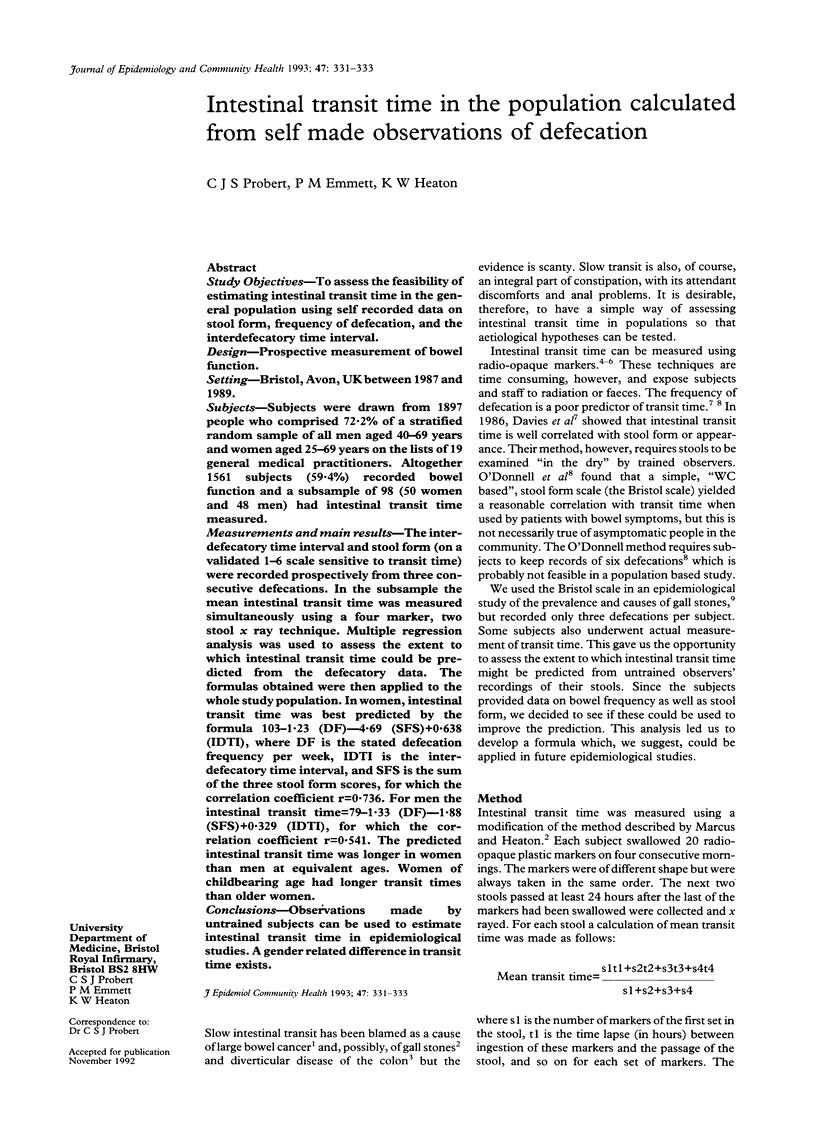Abstract
STUDY OBJECTIVES--To assess the feasibility of estimating intestinal transit time in the general population using self recorded data on stool form, frequency of defecation, and the interdefecatory time interval. DESIGN--Prospective measurement of bowel function. SETTING--Bristol, Avon, UK between 1987 and 1989. SUBJECTS--Subjects were drawn from 1897 people who comprised 72.2% of a stratified random sample of all men aged 40-69 years and women aged 25-69 years on the lists of 19 general medical practitioners. Altogether 1561 subjects (59.4%) recorded bowel function and a subsample of 98 (50 women and 48 men) had intestinal transit time measured. MEASUREMENTS AND MAIN RESULTS--The interdefecatory time interval and stool form (on a validated 1-6 scale sensitive to transit time) were recorded prospectively from three consecutive defecations. In the subsample the mean intestinal transit time was measured simultaneously using a four marker, two stool x ray technique. Multiple regression analysis was used to assess the extent to which intestinal transit time could be predicted from the defecatory data. The formulas obtained were then applied to the whole study population. In women, intestinal transit time was best predicted by the formula 103-1.23 (DF)--4.69 (SFS)+0.638 (IDTI), where DF is the stated defecation frequency per week, IDTI is the interdefecatory time interval, and SFS is the sum of the three stool form scores, for which the correlation coefficient r = 0.736. For men the intestinal transit time = 79-1.33 (DF)--1.88 (SFS)+0.329 (IDTI), for which the correlation coefficient r = 0.541. The predicted intestinal transit time was longer in women than men at equivalent ages. Women of childbearing age had longer transit times than older women. CONCLUSIONS--Observations made by untrained subjects can be used to estimate intestinal transit time in epidemiological studies. A gender related difference in transit time exists.
Full text
PDF


Selected References
These references are in PubMed. This may not be the complete list of references from this article.
- Brauer P. M., Slavin J. L., Marlett J. A. Apparent digestibility of neutral detergent fiber in elderly and young adults. Am J Clin Nutr. 1981 Jun;34(6):1061–1070. doi: 10.1093/ajcn/34.6.1061. [DOI] [PubMed] [Google Scholar]
- Burkitt D. P. Epidemiology of cancer of the colon and rectum. Cancer. 1971 Jul;28(1):3–13. doi: 10.1002/1097-0142(197107)28:1<3::aid-cncr2820280104>3.0.co;2-n. [DOI] [PubMed] [Google Scholar]
- Cummings J. H., Jenkins D. J., Wiggins H. S. Measurement of the mean transit time of dietary residue through the human gut. Gut. 1976 Mar;17(3):210–218. doi: 10.1136/gut.17.3.210. [DOI] [PMC free article] [PubMed] [Google Scholar]
- Cummings J. H., Wiggins H. S. Transit through the gut measured by analysis of a single stool. Gut. 1976 Mar;17(3):219–223. doi: 10.1136/gut.17.3.219. [DOI] [PMC free article] [PubMed] [Google Scholar]
- Davies G. J., Crowder M., Reid B., Dickerson J. W. Bowel function measurements of individuals with different eating patterns. Gut. 1986 Feb;27(2):164–169. doi: 10.1136/gut.27.2.164. [DOI] [PMC free article] [PubMed] [Google Scholar]
- Eastwood M. A., Brydon W. G., Baird J. D., Elton R. A., Helliwell S., Smith J. H., Pritchard J. L. Fecal weight and composition, serum lipids, and diet among subjects aged 18 to 80 years not seeking health care. Am J Clin Nutr. 1984 Sep;40(3):628–634. doi: 10.1093/ajcn/40.3.628. [DOI] [PubMed] [Google Scholar]
- Gear J. S., Brodribb A. J., Ware A., Mann J. I. Fibre and bowel transit times. Br J Nutr. 1981 Jan;45(1):77–82. doi: 10.1079/bjn19810078. [DOI] [PubMed] [Google Scholar]
- Heaton K. W., Braddon F. E., Mountford R. A., Hughes A. O., Emmett P. M. Symptomatic and silent gall stones in the community. Gut. 1991 Mar;32(3):316–320. doi: 10.1136/gut.32.3.316. [DOI] [PMC free article] [PubMed] [Google Scholar]
- Heaton K. W., Ghosh S., Braddon F. E. How bad are the symptoms and bowel dysfunction of patients with the irritable bowel syndrome? A prospective, controlled study with emphasis on stool form. Gut. 1991 Jan;32(1):73–79. doi: 10.1136/gut.32.1.73. [DOI] [PMC free article] [PubMed] [Google Scholar]
- Heaton K. W., Radvan J., Cripps H., Mountford R. A., Braddon F. E., Hughes A. O. Defecation frequency and timing, and stool form in the general population: a prospective study. Gut. 1992 Jun;33(6):818–824. doi: 10.1136/gut.33.6.818. [DOI] [PMC free article] [PubMed] [Google Scholar]
- Hinds J. P., Stoney B., Wald A. Does gender or the menstrual cycle affect colonic transit? Am J Gastroenterol. 1989 Feb;84(2):123–126. [PubMed] [Google Scholar]
- Marcus S. N., Heaton K. W. Intestinal transit, deoxycholic acid and the cholesterol saturation of bile--three inter-related factors. Gut. 1986 May;27(5):550–558. doi: 10.1136/gut.27.5.550. [DOI] [PMC free article] [PubMed] [Google Scholar]
- Metcalf A. M., Phillips S. F., Zinsmeister A. R., MacCarty R. L., Beart R. W., Wolff B. G. Simplified assessment of segmental colonic transit. Gastroenterology. 1987 Jan;92(1):40–47. doi: 10.1016/0016-5085(87)90837-7. [DOI] [PubMed] [Google Scholar]
- O'Donnell L. J., Virjee J., Heaton K. W. Detection of pseudodiarrhoea by simple clinical assessment of intestinal transit rate. BMJ. 1990 Feb 17;300(6722):439–440. doi: 10.1136/bmj.300.6722.439. [DOI] [PMC free article] [PubMed] [Google Scholar]
- Painter N. S., Burkitt D. P. Diverticular disease of the colon: a deficiency disease of Western civilization. Br Med J. 1971 May 22;2(5759):450–454. doi: 10.1136/bmj.2.5759.450. [DOI] [PMC free article] [PubMed] [Google Scholar]
- Rao S. S., Read N. W., Brown C., Bruce C., Holdsworth C. D. Studies on the mechanism of bowel disturbance in ulcerative colitis. Gastroenterology. 1987 Nov;93(5):934–940. doi: 10.1016/0016-5085(87)90554-3. [DOI] [PubMed] [Google Scholar]
- Stephen A. M., Wiggins H. S., Englyst H. N., Cole T. J., Wayman B. J., Cummings J. H. The effect of age, sex and level of intake of dietary fibre from wheat on large-bowel function in thirty healthy subjects. Br J Nutr. 1986 Sep;56(2):349–361. doi: 10.1079/bjn19860116. [DOI] [PubMed] [Google Scholar]
- Thomason B. M. Misuse of fluorescent antibody tests for the detection of enteropathogenic Escherichia coli. Am J Dis Child. 1971 May;121(5):450–450. doi: 10.1001/archpedi.1971.02100160120023. [DOI] [PubMed] [Google Scholar]
- Wyman J. B., Heaton K. W., Manning A. P., Wicks A. C. Variability of colonic function in healthy subjects. Gut. 1978 Feb;19(2):146–150. doi: 10.1136/gut.19.2.146. [DOI] [PMC free article] [PubMed] [Google Scholar]


